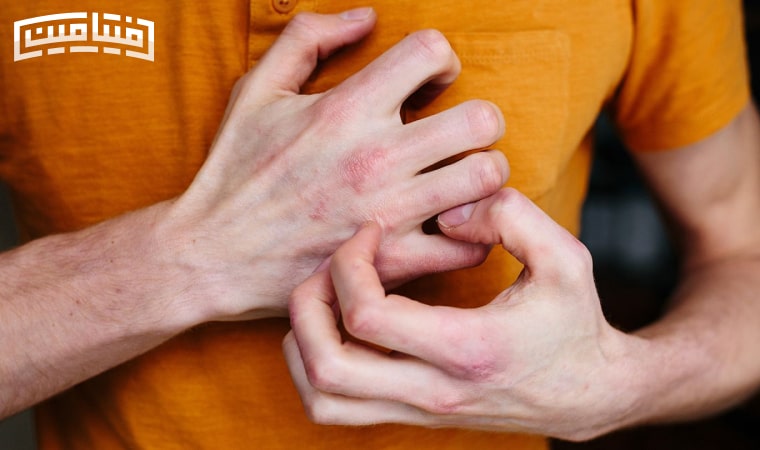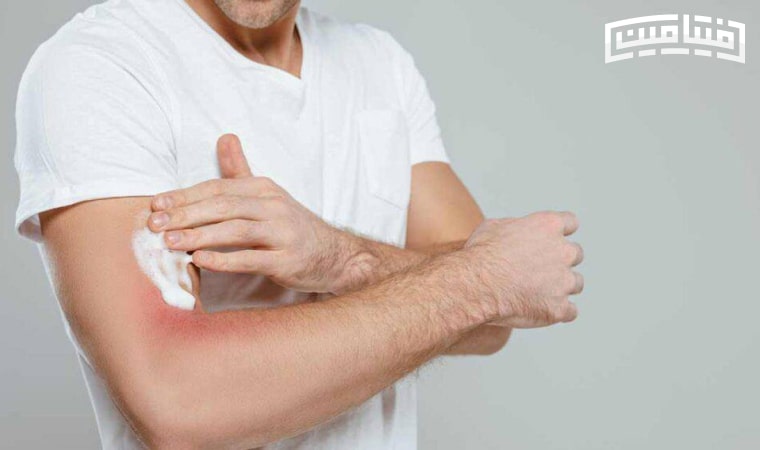What is eczema and why is it? What to do for eczema? Eczema is a type of skin disease that causes itching and redness of the skin. Eczema has different types: hand eczema, eczema foot, facial eczema, etc.
The disease is caused for certain reasons and is not specific to a specific age range. Fortunately, there are various ways to control and treat eczema that we will introduce. So if you are frustrated with your skin disease and are looking to treat it, read this to the end.
What is eczema?
Eczema is an annoying skin disease associated with redness, itching and rash. Eczema can appear anywhere in the body, including the skin of the scalp. The disease weakens the skin protection barrier, which is responsible for maintaining moisture and protecting the body against external factors.
In this disease, the skin becomes extremely inflamed and dry. Eczema itself is a kind of dermatitis. Dermatitis is a group of skin diseases that cause inflammation of the skin. Dermatitis can affect people at any age, although some of it are more common in certain age groups.

The cause of eczema
Eczema is a complex and multi -factor disease, in the sense that it is affected by different genetic and environmental factors. The immune system disorder can also play a role in eczema. The exact cause varies depending on the type of eczema, but some of the common reasons are mentioned below.
Eczema genetic and hereditary factors
Eczema has a strong genetic and hereditary component. Many genes are involved in the disease. For this reason, the disease is often seen among members of a family.
The role of stress in eczema
Stress is an exacerbation agent and skin diseases because it can disrupt the immune system and the skin barrier. Stress disrupts skin health and reduces the ability of the epidermis to regenerate the skin. This will cause faster loss of cognitive cells and reduce the cohesion of the skin protective layer, thereby increasing the permeability of the skin dam.
Environmental factors affecting eczema
In the past four decades, the prevalence of dermatitis among the world has increased. This increase cannot only be explained by genetic factors and environmental changes are also involved, including:
- Excessive hygiene that leads to less stimulation of the immune system in children.
- Excessive skin wash
- Homes that are overly insulated but have inappropriate ventilation; As a result, they provide a good environment for germs growth.
- Increase the number of pets
- Early starting food in babies
- Increased exposure to urban pollution and cigarette smoke
- Pregnancy at an older age
- Stimulants and chemicals (stimulants such as soaps, detergents and even some cosmetics).
- Inappropriate weather conditions, such as very cold and dry weather or seasonal changes.
- Excessive bathing or hot water and the use of rough cleaners can cause dry skin and stimulate eczema, especially in the face and hands.
How is eczema treatment?
Symptoms and severity of eczema can be different for anyone, so it cannot be considered and prescribed for all people; But in general, the following are recommended to help control eczema:
- Take a regular bathing routine with the right detergent and adhere to it (choosing in the bathroom detergents and maintaining health)
- Know the eczema stimuli and avoid as much as you can.
- Keep your skin moist with creams and ointments that your doctor recommends.


Common medications for the treatment of eczema
Whether your eczema is mild, or extreme, the main carer involves bathing with a gentle cleanser and frequent skin moisturizing to help repair the skin dam. It is best to help your doctor or pharmacist choosing a detergent and moisturizer. Of course, in addition to these principles, there are various therapeutic drugs, including:
- Topic drugs such as hydrocortisone
- Topical prescription drugs you apply on the skin.
- Exercise drugs prescribed injectable.
- Oral prescription drugs taken orally and in the form of tablets.
- Antibiotics that, in the event of an infection, may prescribe oral antibiotics.
- The phototherapy that is prescribed and is a kind of ultraviolet treatment.
Care Tips for Eczema Management
Doctors refer to what exacerbates eczema as “stimuli”; It is important to understand what your skin hurts to avoid them; But some of the most common eczema stimuli are:
- Rough and rough clothing
- Sweat
- Moisture
- Change temperature
- Rigid routine
- Perfume products (such as paper napkins or perfume creams)
- Stress
The importance of stress control in the treatment of eczema
Stress is a well -known stimulus to exacerbate eczema. When you are under stress, your body releases cortisol, a hormone that can directly contribute to skin dam dysfunction, irregular inflammation, and increase the risk of infections. This will exacerbate the symptoms and exacerbate eczema.
The importance of nutrition in the treatment of eczema
The important thing about eczema nutrition and treatment is that sometimes you have a food allergy and lead to skin symptoms and confuse eczema, or even overlap with eczema. Since some food allergies can stimulate the immune system, eczema is also exacerbated.
This is not the case for everyone with eczema. That’s why it’s important to talk to your doctor and monitor your symptoms to see if some foods affect eczema.
The importance of exercise in the treatment of eczema


Exercise can have a positive impact on control and improvement of eczema for three reasons (reducing stress, improving blood circulation and strengthening the immune system), but in some cases it may exacerbate symptoms.
Exercise is often a challenge for people with severe eczema, as excessive sweating stimulates the skin and causes itching or inflammation. Also, if you do not shower after exercise and do not moisturize the skin, the skin may become more dry and more sensitive. Another important thing is to wear appropriate clothing during exercise, you must have a free and loose -fitting clothing that does not stimulate the skin. Tips for Exercise Without Eczema Stimulation:
- Choosing the right dress: Wear loose and loose -fitting clothes to absorb sweat and not stimulate the skin.
- Avoid excessive sweating: Exercise in cool environments and if you sweat, wash your skin with lukewarm water and moisturize.
- Drink enough water: Dehydration can cause dryness of the skin and worsen the symptoms of eczema.
- Avoid exercising in very hot or dry air: Exercise in very hot and dry air may irritate the skin and cause eczema symptoms in the body.
- Use moisturizer before and after exercise: The use of suitable creams for exercise prevents dryness and irritation of the skin.
The importance of sufficient sleep in the treatment of eczema
Since sleep deficiency can cause more secretion of cortisol hormone, it is effective in controlling the symptoms of eczema. When sleeping, the body performs the process of repairing damaged cells. Sleep helps to heal wounds, reduce dryness and maintain skin health.
We recommend moisten your skin with moisturizing creams without aroma and irritating ingredients to prevent dryness and itching. Do not wear tight or artificial materials while sleeping because they can irritate the skin.
If the room’s air is dry, (especially in desert areas), use an incinerator to help maintain skin moisture.
Frequently asked questions
Is eczema dangerous?
Eczema is generally not a dangerous disease, but if not managed it can lead to bacterial, viral or fungal infections.
Is eczema contagious?
No, eczema is not a contagious disease and is not transmitted from person to person.
What if eczema is not treated?
Continuous itching may lead to ulcers and skin cracks and increase the risk of infection. In addition, lack of treatment may cause thickening of the skin.
Final speech
Eczema is a type of skin disease that causes inflammation, redness and itching of the skin. The disease is caused by a variety of reasons such as genetics, stress and contamination. There are various ways to control and treat eczema. In this article, we first defined the eczema and then discussed the reasons for it and introduced various ways to treat eczema.
Resources: Dexryl – Nationalczema- Mayoclinic
RCO NEWS
RCO

















